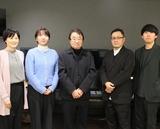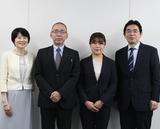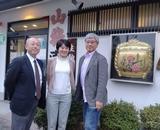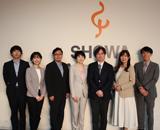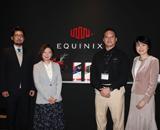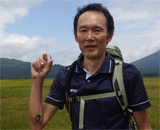September 2017
Osada Electric Co., Ltd. - Customer First: A 13-year Partnership Based on Shared Values Revitalizes a Website
Since its founding in 2005, Arc Communications has supported various clients' work with websites, pamphlet production, translation, interpretation, and temporary staffing services. Meeting new clients is always a fresh and stimulating experience, but we work hard every day to turn these new beginnings into long-term relationships.
Our guest for this feature interview is Osada Electric, a company with which Arc Communications has built one of its longest relationships in its Web department, harking as far back as when Arc Communications was first founded.
Osada Electric was founded in 1935 and is a long-established manufacturer of dental and medical equipment, and a top company supporting Japanese dentistry. Many people may remember seeing the "Osada" name on the dental unit when visiting the dentist.
In a wide-ranging and enjoyable conversation about Osada Electric and its long relationship with Arc Communications, we discovered many new things that the two companies have in common.
From left to right:
Top row: Shinichiro Shibata, Yoshihiro Sato, Isao Ikeda, Misato Sugisaki and Hideharu Okamoto
Bottom row: Mariko Ohsato and Yoshihiro Osada
- Profile
- Yoshihiro Osada: Representative Director and President, Osada Electric Co., Ltd.
- Isao Ikeda: Head of the Corporate Planning Office, Osada Electric Co., Ltd.
- Hideharu Okamoto: Sales Division, Head of the Sales Planning & Management Center, Osada Electric Co., Ltd.
- Misato Sugisaki: Sales Division, Sales Planning & Management Center, Osada Electric Co., Ltd.
- Mariko Ohsato: CEO & President, Arc Communications Inc.
- Yoshihiro Sato: Operating Officer, Web & Cross Media Executive Manager, Arc Communications Inc.
- Shinichiro Shibata: Web & Cross Media Chief Director, Arc Communications Inc.
The Desire to Make Equipment that Fits Japanese People: the Catalyst for Founding Osada
Ohsato: Osada Electric (hereafter Osada) has supported us for a long time, ever since we first got started as a company. It has been 13 years now, and we're very happy that you've continued to work with us for this long.
Osada: It's been 13 years already... It is really our company that has enjoyed your support for so long.
Ohsato: It feels like we have worked hard in the 13 years since Arc Communications (hereafter Arc) was founded, but it's nothing compared to the 82-year history of Osada. Just imagining our 82nd year in business... Of course, we won't be around for that. (Laughs)
Osada: (Laughs) I wasn't around for the company's founding, either. My grandfather, the previous chairman (now deceased), was the founder. He came out to Tokyo from Aichi Prefecture and had a job making motors for dental equipment, and he later set up Osada as his own business. The main office is still in the same place he founded the company (Nishigotanda, Shinagawa-ku, Tokyo).
Shibata: I visited your factory in Aichi the other day to cover it for your recruiting page. It was very spacious and clean, and a great environment, but I was wondering why it was in Aichi. Now I know - it was where the previous chairman was from.
Osada: Yes. The company originally had a factory in Tokyo, but temporarily stopped manufacturing electrical engines during the war and evacuated to Aichi. They borrowed the chicken coop in the previous chairman's family home and resumed manufacturing there. After the war, they left part of the factory in Aichi when they came back to Tokyo to resume business. That system is still in place today.
Ohsato: As someone who runs a business, I have nothing but respect for companies who survived through times like that and are still in business today.
Osada: Thank you. But to be honest, many of the companies in our industry are long-lived. It's not just Osada - many of our competitors have similarly long histories. It's an industry with a long history. (Laughs)
Sato: That's very interesting! My impression was of a fast-moving, high-tech industry, but maybe so many companies have long histories because building trust is important in the medical industry.
Shibata: When we first started working together, I got the impression that Osada put a lot of energy into international business. Aren't there a lot of dental unit products from overseas companies?
Osada: Yes. One of the reasons the previous chairman founded the business was that at the time, the vast majority of dental treatment equipment was made overseas. He felt that foreign equipment wasn't well-suited to Japan. For example in terms of humidity, many other countries are relatively dry, while Japan is humid. Humidity affects motor operation, so it's better to have products made specifically for Japan. And for dental units, it's difficult for patients to relax if the chairs don't fit their body type. Those were the circumstances that led to the desire to make something tailored for Japanese people, and the catalyst to start Osada.
Valuing Relationships with Customers: our Two Companies' Shared Values
Sato: Osada handles the whole process from development and production to sales, right? Are there many companies that do that?
Osada: I think we're able to do that to a higher degree than anyone else in our industry.
Sato: From a cost perspective, it seems like it would be more efficient to make products using parts imported from overseas.
Osada: That's one of the things we're very picky about. We want to thoroughly focus on quality, and to live up to the expectations our customers have for Osada, I think it's best to make things ourselves.
Sato: So you focus not only on manufacturing, but on your relationships with your customers. I have heard you have a strong reputation for your sales efforts.
Osada: That's a result of our focused efforts as well. Take the chair for a dental unit, for example. Once it's purchased, the customer will use it for five years, ten years, or longer. We consider the purchase to be the beginning of a long relationship, so we visit the customer regularly to make sure they can use it in its best condition for a long time. The fact that people appreciate our efforts and many dentists have formed deep, long relationships with us is something we're proud of.
Ohsato: Atually, one of Arc's guiding principles is that rather than get one job each from ten clients, we will provide the level of service that gets us ten jobs from one client. That style of work is something I care very much about, so your approach resonates deeply for me.
Osada: I see. This is the first time I heard that, but that's a wonderful idea. Maybe the similar company approaches are behind the long relationship we have enjoyed with Arc.
Understanding and Conveying Approaches: the Catalyst for Partnerships
Ikeda: I first met Arc 13 years ago during a call for bids for our website renewal. I think the presentation materials Arc prepared at the time are relevant to what we've been talking about, and I brought them with me today.
Sato: This is embarrassing... (Laughs)
Ikeda: Due to various circumstances surrounding the call for bids, we were forced to ask for extremely tight turnarounds on the business proposals. It was unreasonable and we felt bad about it, but we made the requests to each company and ultimately decided to work with you.
Ohsato: I remember that very well. The request came in immediately before we opened for business, and I remember having conversations in the company saying, "If we get this, it will be our first project."
Ikeda: It brings back memories, doesn't it? Out of all of the proposals we got from various companies, Arc's stood out in more ways than one. To be specific, every company submitted proposals that followed the requirements specifications we created, but Arc's proposal was more like, "You should do this, you should do that," and was different from what we had requested. (Laughs) I was surprised, but at the same time, I felt like that might be what we had been looking for.
Sato: You had created very solid requirements specifications, so it was very easy to understand what you were looking for. We could sense a strong feeling of what you wanted to do. Companies that create solid requirements specifications are usually on one end of the spectrum or the other - either they don't want to deviate from them at all, or they want to do anything but follow the specifications exactly. When I read between the lines on Osada's requirements specifications, I got the feeling that you wanted us to think about it from a professional standpoint and propose something only we could offer. That was pure conjecture, of course. (Laughs) We only have a short time to put together a proposal, so it might not work, but let's make sure to convey what we really think. I'm sure they'll understand... That's what I thought.
Ikeda: You said clearly that you couldn't create the kind of materials we were asking for in so short a timeframe, didn't you? (Laughs)
Osada (While reading the proposal): You made sure to include the concepts we still focus on - Customers first and our Emphasis on quality.
Ohsato: It looks like the values we have in common are reflected in this proposal, too.
Feature Interview Index

